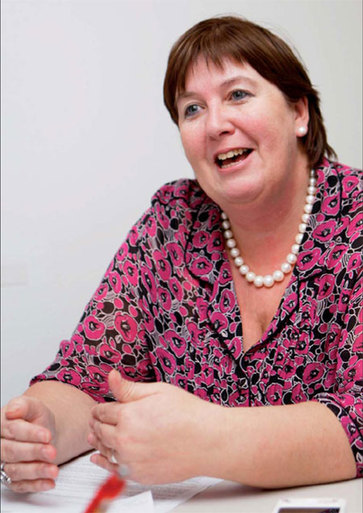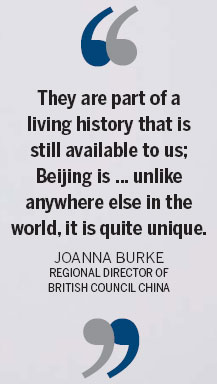Home link
Updated: 2012-04-20 11:07
By Li Aoxue (China Daily)
|
|||||||||||
 |
|
[Zhang Tao / China Daily] |
Briton's work extends long-time affinity with China
For many Westerners visiting Beijing for the first time, it can be an amazing sight: groups of middle-aged residents twirling around, dancing to the beat from stereo speakers right in the open squares of public parks. But for Joanna Burke, the regional director of British Council China, this is one crucial link from one Olympic host city to the next. "This is an everyday sight in Beijing, but not in London," Burke says, laughing. "We are therefore very excited about it."
She is referring to the "Big Dance", a nine-day-long dancing festival to be held in London in July. At least 2,000 people are expected to dance at locations such as shopping centers, parks and galleries in the city, which will then be linked via video to Beijing, where Burke hopes to have a similar number of people dancing in the parks.
"Big Dance" itself is under the Cultural Olympiad, one of three major events of the British Council this year to help mark the 2012 Olympics in London.
For the second event, UK Now, hundreds of offerings covering a wide range of British arts are being put up in 15 Chinese cities.
"The program itself will be particularly focused on diversity not only at where we are going to show the works, but also at representations from able-bodied performers and their counterparts who suffer from physical disabilities," Burke says.
The British Council is the country's international organization for educational opportunities and cultural relations. It works in more than 100 countries worldwide to provide access to Britain's assets, including language, arts, education and society, to build opportunity and trust for the country through the exchange of knowledge and ideas between people.
 |
It was first established in 1934 and opened its Chinese office in Beijing in 1943. It now has five offices in China, and Burke has been China regional director since August 2007.
The third event on the council's list is the London Book Fair, with China as the focus this year.
China was selected in part because of the increasing interest in Chinese literature and Chinese translations. Burke and her colleagues are supporting British publishers to expand and help improve the field.
"That will drive a big explosion and interest in Chinese literature, and we are working very closely to make it happen," Burke says.
For her, all these efforts seem like a natural extension of a long-time fascination with China.
Burke came to China as one of the first undergraduates from Britain to study in the country in 1979. Inspired by her father who spent a lot of time in the 1940s learning Chinese, Burke started to learn Chinese when she was 16 by attending evening classes. Despite the repetitive teaching methods that reduced the initial group of eight students to just one, Burke was permanently hooked.
"I was attracted by the intellectual challenges posted by the Chinese characters," says Burke, who went on to study Chinese at Leeds University in 1978.
As a British undergraduate whose major was Chinese, Burke has read a lot of Chinese books and her favorite one is the classic work, A Dream of Red Mansions, by Cao Xueqin.
"It is a romantic story, for sure, but I really love the detail in that book", Burke says.
"It is interesting to read about the details of their daily lives what they ate and what they wore. For me, it is not a history of dynasties but the history of daily life of people in Beijing that is so attractive to me," Burke says.
In 1979, Burke was delighted to be offered the chance to spend her second year in Beijing. Coming to the Chinese capital was clearly different from anything she had experienced. Burke not only stayed in Beijing but also flew to Hong Kong and returned by train via Guangzhou and Shenzhen in the south.
By the time she completed her studies in China, she fell in love with the capital.
"I still consider the Beijing Railway Station a beautiful building; I like the design of the clock face, it is lovely," says Burke, who now lives with her husband and two children in the city.
In her spare time, Burke likes to take photographs of the city's traditional alleways and the remains of its palaces and temples.
"They are part of a living history that is still available to us; Beijing is ... unlike anywhere else in the world, it is quite unique," Burke says.
Burke and her colleagues have also been working on a delegation of museum directors to Britain, under a three-year exchange program between directors of museums in Britain and their counterparts in China. The program aims to bring arts institutions from Britain and their counterparts from China to collaborate on projects.
Similar to other cultural institutions in China, the British Council also helps students find jobs after they graduate from Britain.
To that effect, her organization has roped in human resources firms from China to Britain to meet students and introduce job opportunities. It also posts job opportunities online in line with the mutual interests of graduates from both countries.
"We recognize that sending students to study overseas is a major investment, and it is important to help them get back that investment after they graduate," Burke says.
liaoxue@chinadaily.com.cn
Today's Top News
Rescuers race against time for quake victims
Telecom workers restore links
Coal mine blast kills 18 in Jilin
Intl scholarship puts China on the map
More bird flu patients discharged
Gold loses sheen, but still a safe bet
US 'turns blind eye to human rights'
Telecom workers restore links
Hot Topics
Lunar probe , China growth forecasts, Emission rules get tougher, China seen through 'colored lens', International board,
Editor's Picks

|

|

|

|

|

|





